#ionicframework
Explore tagged Tumblr posts
Text
How to Display an Image in the Ionic Framework.
Como Mostrar Una Imagen en Ionic Framework.
👉 https://blog.nubecolectiva.com/como-mostrar-una-imagen-en-ionic-framework/

0 notes
Text
Create Mobile Apps with Ionic & Firebase: Step-by-Step Guide
Master the skills of mobile app development using Ionic & Firebase with this comprehensive course on EasyShiksha. Learn to build real-time, dynamic mobile applications with ease, from front-end design to backend integration. Enroll today!
0 notes
Text

Top Ionic Developers for Hire | Elevate Your Mobile App | AIS Technolabs
Ready to develop a cutting-edge mobile app? HIre our Ionic developers experts in crafting smooth, cross-platform experiences that engage users and perform flawlessly. Hire our talented developers today and bring your vision to life with expert guidance and support.
#ionic developers#Mobile App Development#Cross Platform Apps#hire developers#ionicframework#app development#techtalent#mobiledevelopment#Ionic#App Development Services
0 notes
Text

Transform your app vision into reality with IONIC! Our dedicated developers bring expertise and innovation to every project. Reach out today to start building your dream app! 🔗Learn more: https://greyspacecomputing.com/ionic-mobile-app-development-services/ 📧 Visit: https://greyspacecomputing.com/portfolio/
#IONIC#GreySpaceComputing#CrossPlatform#MobileApp#AppDevelopment#ionicframework#webdevelopment#IONICIntegration#mobileapps#UserExperience#DreamApp#TechDevelopment#appdevelopment#apppresser#appbuilding#customapps#plugins#ecommerce#iosapps#androidapps#developers#wordpressdevelopers#phonegap#pushnotifications#wordpressmobileapp#iosappdev#androidappdev#wordpressmobileapps#ionic#android
1 note
·
View note
Text
0 notes
Text
Ionic vs. Flutter: Which Framework Is Right for Your App Development?

In today's fast-paced world, mobile app development has become an essential part of our lives. Mobile applications enable us to accomplish a wide range of tasks, from placing food orders and arranging transportation to staying in touch with our dear ones. To create these apps, developers have excessive tools at their disposal, including frameworks like Ionic and Flutter. In this blog, we'll delve into the differences between Ionic and Flutter to help you make an informed choice for your app development needs.
Full Blog: Ionic vs. Flutter: Which Framework Is Right for Your App Development?
0 notes
Text
Empower Business with Ionic App Development Service at Misha Infotech

#IonicAppDevelopment#IonicFramework#CrossPlatformApps#MobileAppDevelopment#HybridApps#IonicDevelopment#AppDevelopment
0 notes
Text
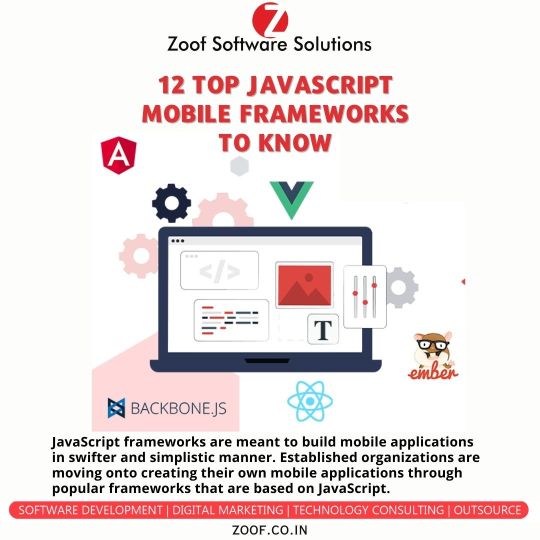
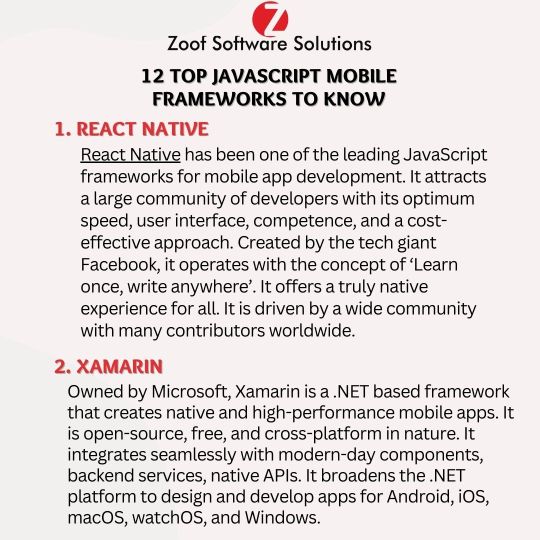
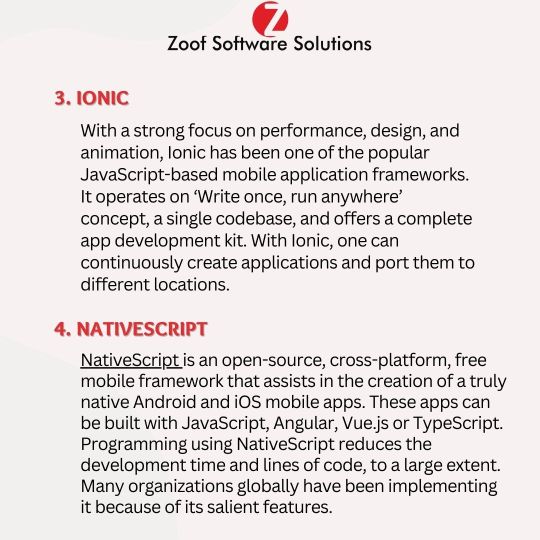
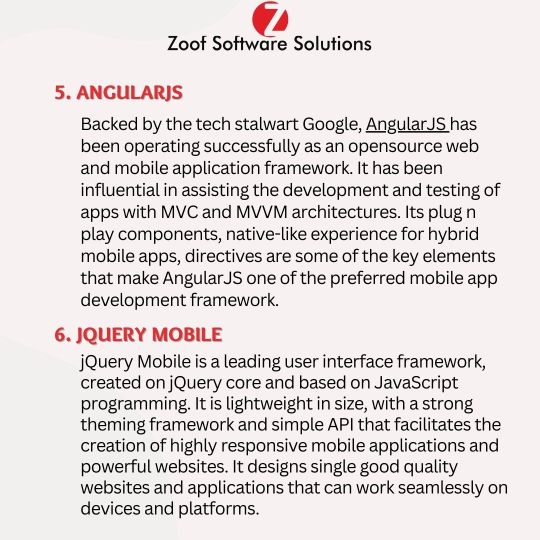
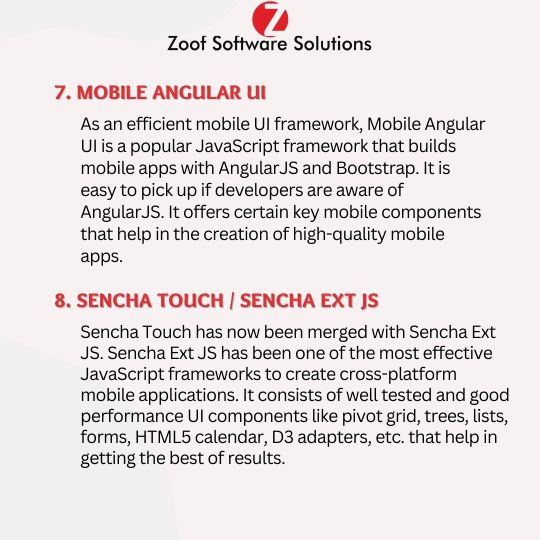
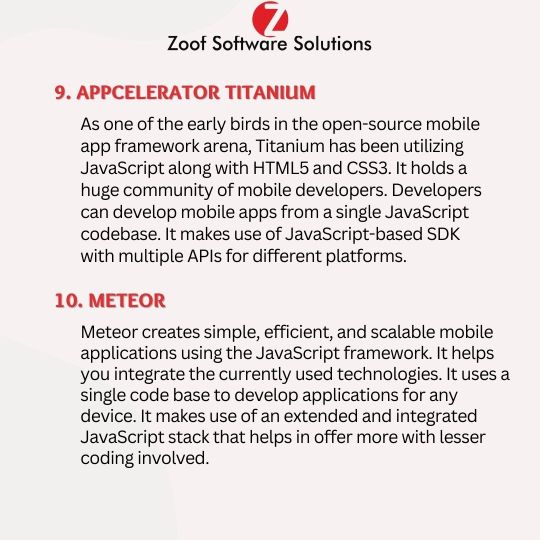
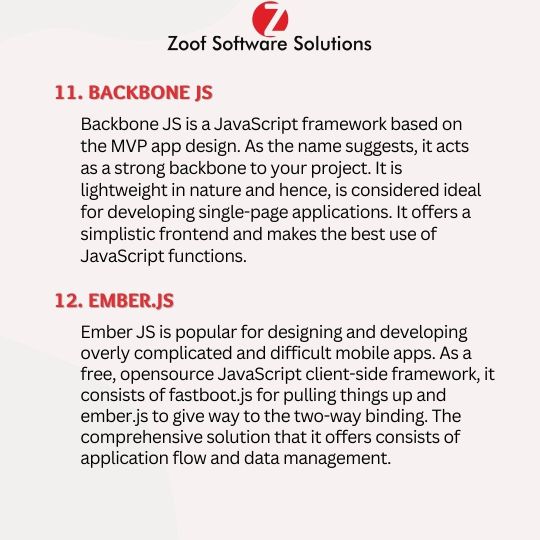
12 Top JavaScript Mobile Frameworks To Know
JavaScript mobile frameworks are tools that allow developers to build mobile applications using JavaScript, HTML, and CSS. These frameworks provide a set of pre-built components and libraries, making it easier to create cross-platform mobile apps that run smoothly on different devices and operating systems.
1. React Native
2. Xamarin
3. Ionic
4. Nativescript
5. AngularJS
6. Jquery Mobile
7. Mobile Angular UI
8. Sencha Touch / Sencha Ext js
9. Appcelerator Titanium
10. Meteor
11. Backbone js
12. Ember.js
#javascript#framework#ReactNative#html#IonicFramework#programming#Flutter#coding#developer#webdeveloper#NativeScript#css#bootstrap#laravel#js#jquery#angular#SoftwareCompany#StartUpTechnology#mobilefriendlywebsite#GrowBusiness#WebsiteDevelopment#SoftwareConsultant#ZoofSoftwareSolutions#zoof#zoofinc#MobileAppDevelopment#AwardWinningCompany#BestSoftwareCompany#digitalmarketing
0 notes
Text
Why Ionic Outperforms Flutter in 2024: 7 Data-Driven Reasons to Choose Ionic

In the competitive realm of hybrid app development, selecting the right framework is crucial for ensuring the success of your project. As of 2024, Flutter and Ionic are the two leading contenders in the field. While both frameworks have their strengths, an in-depth analysis of data and technical aspects reveals that Ionic may have the edge for many developers and businesses. Here’s why Ionic stands out, supported by compelling statistics and technical insights.
1. Hybrid Approach Enhances Performance
Performance is a pivotal factor in choosing a development framework. Ionic’s hybrid approach utilizes pre-existing plugins and technologies that enhance development efficiency while maintaining high performance. Ionic delivers a consistent 60 FPS across both desktop and mobile platforms, demonstrating its ability to offer smooth and reliable user experiences.
Flutter, known for its native compilation and custom rendering engine, also achieves 60 FPS. However, while Flutter’s hot reload feature can accelerate development, it doesn’t always translate to faster overall development time. Data suggests that Flutter's hot reload can reduce development time by up to 63%, but this benefit is often counterbalanced by the complexity of the app being developed.
2. Superior UI Customization and Flexibility
UI design flexibility is another critical factor where Ionic excels. Ionic leverages web technologies such as HTML, CSS, and JavaScript, providing developers with a comprehensive library of pre-designed components. This allows for highly customizable and responsive UIs, with standard-based web components that can be styled to resemble native elements, ensuring a consistent look and feel across various platforms.
Flutter, in contrast, employs its own rendering engine and offers a range of pre-designed widgets. While these widgets adhere to Material Design and Human Interface guidelines and provide extensive customization options, they may not offer the same level of flexibility as the standard web components used by Ionic. For businesses seeking a tailored UI with rapid implementation, Ionic’s approach offers a significant advantage.
3. Enhanced Code Portability and Maintenance
Code portability is a crucial aspect of modern app development, and Ionic’s use of web technologies facilitates this with ease. Developers can deploy a single codebase across mobile, desktop, and Progressive Web Apps (PWA), simplifying code maintenance and updates. This approach reduces the time and effort required to manage different platform versions.
Flutter also supports cross-platform code sharing but relies on Dart, which is less widely adopted than JavaScript. Although Flutter's single codebase approach is effective, developers may face a steeper learning curve with Dart, potentially impacting the speed of development and onboarding.
4. Developer-Friendly Ecosystem
The developer experience is greatly influenced by the ecosystem surrounding a framework. Ionic’s ecosystem is designed to enhance developer convenience, offering extensive documentation and compatibility with popular JavaScript frameworks such as AngularJs , React, and Vue. This integration allows developers to leverage their existing skills and tools, facilitating faster development and maintenance.
Flutter requires proficiency in Dart, a less common language compared to JavaScript. Although Flutter provides comprehensive documentation, the learning curve associated with Dart can be a barrier for new developers or those transitioning from other languages. Ionic’s ecosystem, with its focus on familiar technologies, presents a more accessible option for many developers.
5. Accelerated Development and Deployment
Speed is critical in the app development lifecycle. Ionic’s hybrid approach and efficient use of web technologies contribute to quicker development cycles. With its vast library of components and plugins, developers can rapidly assemble and deploy applications, minimizing the need for extensive custom coding.
Flutter’s hot reload feature is designed to speed up development by allowing real-time updates without restarting the app. While this feature is beneficial, the overall speed of development can still be affected by the complexity of the application and the need for frequent updates. Ionic’s streamlined approach often results in faster development and deployment times.
6. Cost-Effective Development
Cost considerations are always at the forefront of app development decisions. Ionic’s utilization of web technologies and pre-existing plugins often results in more cost-effective development compared to Flutter. The use of JavaScript and established web frameworks typically leads to lower development costs, as teams can build on their existing knowledge and tools.
In contrast, Flutter’s development costs may be higher due to the need for specialized Dart expertise and potentially longer development times for complex applications. Although Flutter can deliver high-performance apps, the associated costs can be a significant factor for businesses operating within tight budgets.
7. Established Community and Support
Community support and available resources play a crucial role in the development process. Ionic’s longer presence in the market has fostered a robust ecosystem of resources, tutorials, and community support. This established network provides valuable assistance for troubleshooting, learning, and keeping up with the latest advancements.
While Flutter is supported by a rapidly growing community and benefits from Google’s backing, it is relatively newer compared to Ionic. As a result, the community support and resources for Flutter are still expanding. For developers seeking a well-established support network, Ionic’s longstanding presence offers a substantial advantage.
Ionic’s Technical Superiority
Ionic excels not only in performance and development efficiency but also through its robust technical features:
Plugin Integration: Ionic utilizes Cordova and, more recently, Capacitor plugins to access host operating system features such as Camera, GPS, and Flashlight. This integration allows developers to build applications that leverage native device functionalities while using a unified codebase.
Comprehensive Framework: Ionic supports building apps that can be customized for a range of platforms, including Android, iOS, Windows, Desktop (with Electron), and modern browsers. This versatility is facilitated through Ionic’s build tools and simplified command-line interface (CLI), which streamlines the app-building and deployment process.
Extensive UI Components: Ionic includes a wide array of mobile components, typography, interactive paradigms, and an extensible base theme. Web Components used in Ionic provide custom elements and methods for interaction. Notable components like virtual scroll allow for smooth scrolling through extensive lists, while tabs create native-style navigation with history state management.
Development Tools: Ionic offers services that enable code deploys and automated builds. Although its own IDE, Ionic Studio, was discontinued in 2020, the CLI remains a powerful tool for project creation, plugin management, push notifications, and native binary generation.
Conclusion
In conclusion, while both Flutter and Ionic offer distinct benefits for hybrid app development, data and technical insights indicate that Ionic may be the preferable choice for many projects. With its hybrid approach, superior UI customization, code portability, and developer-friendly ecosystem, Ionic presents a compelling option for businesses looking to develop high-performance, cost-effective applications.
If you're considering developing a new application or updating an existing one, hiring Ionic developers could significantly enhance your project’s success. Ionic’s strengths in development efficiency and technical versatility make it a robust and effective choice in the competitive landscape of hybrid app development.
By choosing Ionic, and with the expertise of skilled Ionic developers, you can harness a framework with a proven track record, ensuring efficient development and deployment processes. For a well-established support network and a streamlined development experience, Ionic is the framework to consider.
#Flutter#Ionic#Mobile App Development#Cross Platform Apps#App Development#Hybrid Apps#IonicFramework#Flutter VS IONIC#Tech Comparison#App Performance#Dart Programming#JavaScript Frameworks#Mobile Development Trends#Capacitor#Cordova Plugins
0 notes
Link
We are absolutely in love with the #IonicFramework. We #develop a simple, #robust, and high-functioning #app using #coding platforms like #Java, C++, #CSS, #Angular. Know More:- https://www.mobileappexperts.co.uk/ionic-app-development
#ionicframeworkdeveloper#IonicFramework#MobileAppDevelopmentCompany#App#Coding#Java#C++#CSS#Angular#ionicappdeveloperinlondon#IonicappdevelopmentservicesLondon#IonicapplicationdevelopmentUK#ioniccrossplatformdevelopment#IonicAppDeveloperUK#IonicAppDeveloper#IonicMobileApps#IonicApps
1 note
·
View note
Text

Experience the power of seamless integration with IONIC app development! Our expert team ensures your app provides a superior user experience across all platforms. Let's build something amazing together! 🔗Learn more: https://greyspacecomputing.com/ionic-mobile-app-development-services/ 📧 Visit: https://greyspacecomputing.com/portfolio/
#IONIC#GreySpaceComputing#CrossPlatform#MobileApp#AppDevelopment#ionicframework#webdevelopment#IONICIntegration#mobileapps#UserExperience#apps#PerformanceBoost#appdevelopment#apppresser#appbuilding#customapps#plugins#ecommerce#iosapps#androidapps#developers#wordpressdevelopers#phonegap#pushnotifications#wordpressmobileapp#iosappdev#androidappdev#wordpressmobileapps#ionic#android
1 note
·
View note
Link
1 note
·
View note
Link
New way to start your business by reduce your development cost by 90%
1 note
·
View note
Photo

The #Ionicplatforms offer a diverse & powerful array of capabilities that allow for seamless #crossplatform implementation.
Know More:- https://www.eitbiz.com/ionic-development-services
#Ionicplatforms#crossplatform#Eitbiz#MobileAppsDevelopment#Webdesignanddevelopment#hybridappdevelopment#Ionicapp#Ionicframework#Ionicmobiledevelopment#Ionichybrid#Ionicdeveloper#Ionicmobileappbuilder#Website Developers#Website Design#mobileapps#mobileapplicationdevelopment#prestashopdevelopmentagency#magentodevelopmentagency#websitedevelopment#softwaredevelopment#softwaredeveloper
3 notes
·
View notes
Link
This blog describes the Cross-Platform Apps Development Frameworks that would work best for the year that would arrive.
1. Flutter
2. Ionic
3. React Native
4. PhoneGap
5. Sencha

#cross-platform#appdevelopment#appdevelopers#google#flutter#ionic#ionicframework#native#nativeapp#nativeapps#react native#reactnativedevelopmentcompany#react native developer#phonegap#app development#app developing company#app developers#mobile app development#mobile application development#Mobile App Developers#top mobile app development company#mobile app development company#enterprise#enterprise mobility services
1 note
·
View note
Photo

If you are working on an Ionic project and have encountered the error message "Could not find method compile() for arguments [com.commit451:PhotoView:1.2.4] on object of type org.gradle.api.internal.artifacts.dsl.dependencies.DefaultDependencyHandler" while trying to build your Android app, don't worry - you're not alone! This error is related to the com-sarriaroman-photoviewer plugin and can be resolved with a simple update.
First, let's take a closer look at what this error message means. The message tells us that there is a problem with the script on line 6 of photoviewer.gradle, which is a file within the com-sarriaroman-photoviewer plugin. Specifically, the plugin is trying to call a method called "compile()" on an object of type DefaultDependencyHandler, but it can't find this method. This is because "compile()" has been deprecated in recent versions of Gradle in favor of "implementation()", which is more efficient.
So, how can we fix this error? The solution is actually quite simple. All we need to do is open up photoviewer.gradle and change any instances of "compile()" to "implementation()". To do this, navigate to node_modules > com-sarriaroman-photoviewer > src > android > photoviewer.gradle and look for the dependencies section. Within this section, you should see a line that looks something like this:

All you need to do is change "compile" to "implementation" like this:

Save the file, rebuild your app, and the error should be resolved! If you encounter any other issues, make sure to check the plugin's documentation or seek help from the community.
In summary, the "Could not find method compile()" error in Ionic projects is usually related to the com-sarriaroman-photoviewer plugin and can be fixed by updating any instances of "compile()" to "implementation()" in photoviewer.gradle. This is a simple solution that should help you get back to building your app in no time!
#ionicdevelopment#mobiledevelopment#crossplatformdevelopment#ionicframework#ioniccommunity#ionictricks
0 notes